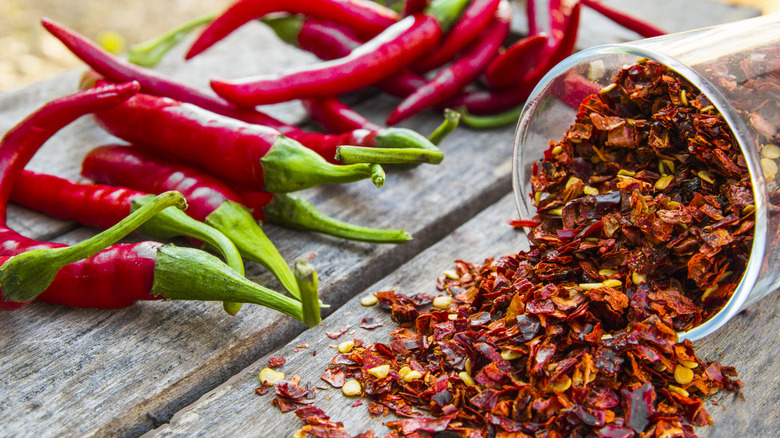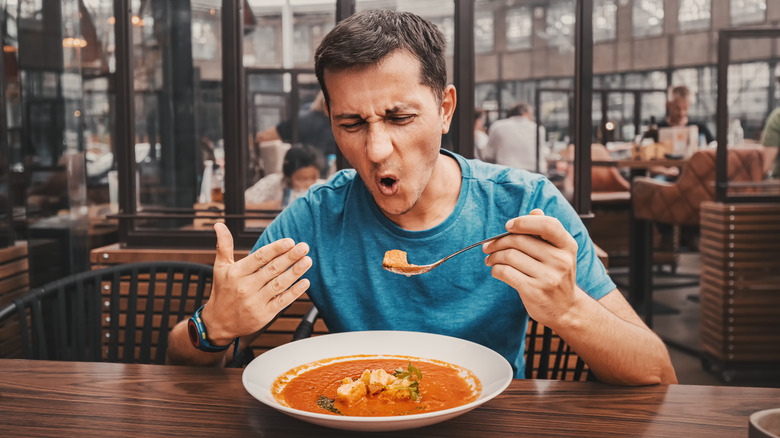The Simple Way To Build Up Your Spicy Food Tolerance
We all know someone who can eat a bunch of chile peppers in one sitting and then grab some more. Other people, however, may experience a tingling sensation, sweating, and overall discomfort after taking just one bite of Nashville hot chicken. If you're one of the latter, you may miss out on some delicious Mexican or Indian dishes, such as chile rellenos, chimichanga, and phaal curry. The good news is, you can build up your spicy food tolerance over time.
First, note that "spicy" isn't a taste but a physical reaction to capsaicinoids. These compounds occur naturally in chile peppers, hot sauce, and other spicy foods. After ingestion, they activate pain receptors in the mouth and tongue, causing a burning sensation. At the same time, our brains release dopamine and other feel-good chemicals to relieve the pain. This reaction may also trigger feelings of pleasure, leaving us craving more.
But that's not all. Capsaicin, one of the compounds mentioned above, also regulates appetite and fights inflammation (per Salisbury University). In the long run, it may protect against diabetes and high blood pressure and boost digestive health.
With some practice, you can train your taste buds to enjoy spicy food and get rid of that burning sensation. After that, you'll discover a whole new world of flavors and take your cooking to the next level.
Use this trick to build your tolerance for spicy foods
Scientists don't really know why some people handle spicy food better than others, but several theories exist. For example, a 2012 study published in Physiology & Behavior found that 18% to 58% of our ability to tolerate spicy foods is genetic. Another theory is that people exposed to spicy food from a young age have an increased tolerance for it. Additionally, the number of taste receptor cells that react to capsaicin varies among individuals, which may affect how we perceive spiciness.
With some practice, you can build up your tolerance for spicy foods. The key is to start small and increase the spice gradually. First, add a dash of black pepper or small amounts of mild chiles to your meals. Better yet, let the Scoville scale guide your choices. This system is used to measure the pungency of chile peppers and other spices. For instance, jalapeño peppers are milder than habanero or cayenne peppers but spicier than sweet peppers. Start from the bottom of the Scoville scale and work your way up over time.
On a similar note, add a bit of Tabasco or another spicy sauce to your daily meals. Do it for several consecutive days, see how your body reacts, and adjust the spice as needed. If, say, you're okay with eating a milder sauce, go one step further and sprinkle red pepper flakes over grilled meat, soups, pasta, or homemade pizza.
Cool your mouth down if the heat becomes too much
Chances are, you won't be able to handle the world's spiciest hot sauces anytime soon. However, even milder spices can set your mouth on fire if you're not used to them. One solution is to drink milk or eat dairy foods to cool down. Casein — a protein in milk and its derivatives — binds to capsaicin molecules, removing them from your tongue. Ice cream will do the trick, too.
Another option is to eat some bread, potatoes, or other starches. You can also pair spicy foods with cooling foods like yogurt, avocado, leafy greens, cucumbers, or watermelons to bring down the heat. Alternatively, reach for tomato sauce, lemon juice, or other acidic foods or beverages. Capsaicin is alkaline, so pairing it with acidic foods can help reduce that burning sensation. Any of these options will work better than drinking a glass of water or a cold beer to cool your mouth down.
As a final word, know when to stop and don't push past your limits. Eating extremely spicy foods can lead to chest or stomach pain, diarrhea, vomiting, headaches, or esophagus burns. "It's like putting a bomb in your stomach if you're not prepared for it," family medicine doctor Allan Capin told the Cleveland Clinic. "Everyone has a limit to what they can tolerate. If you have pain when you eat spicy foods, then stop," he added.


